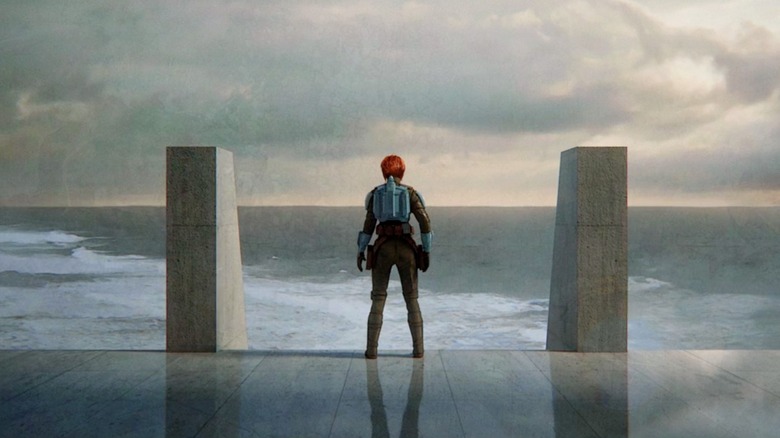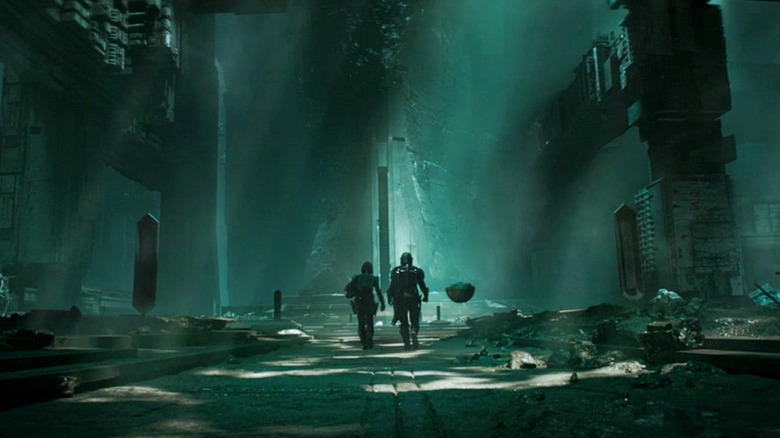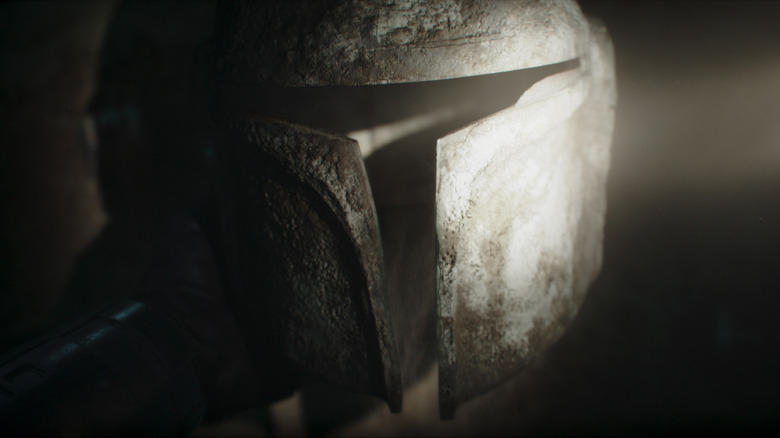The Mandalorian Season 3 Episode 2 And The Last Jedi Have One Major Thing In Common
Warning: This article contains major spoilers for the second episode of "The Mandalorian" season 3.
What happens when we mythologize people and, more generally, the past? It's a question "Star Wars" has explored since its very genesis. In "A New Hope," Luke is partly spurred to join the Rebellion after hearing Obi-Wan's stories of his father, Anakin, and the Jedi. Yet, in "The Empire Strikes Back," the dark truth is revealed, and suddenly Anakin's legacy is no longer a source of inspiration for his son. The prequel trilogy only takes things further, exposing the failure of the Jedi Order to prevent Palpatine's rise to power and their greater complicity in Anakin's downfall.
"The Last Jedi" may have irked some (many? Who can really say) with its approach to this theme, but the motif itself is as quintessentially "Star Wars" as blaster fights and a precarious lack of handrails around chasms in the Empire's super-weapons. It's even one "The Mandalorian" quietly started bringing to the forefront in season 2, when Bo-Katan Kryze politely informs an oblivious Din Djarin he belongs to The Tribe: a sub-set of religious Mandalorian zealots known as the Children of the Watch. "Their goal was to reestablish the ancient way," she tells him. "Din, honey, you're in a cult," I try not to yell at my TV screen every time Din has since risked life and limb to please his so-called family.
Din's ill-conceived quest to win back The Tribe's favor comes to a head in "Chapter 18: The Mines of Mandalore," when he very nearly kills himself trying to purge his "sins" by bathing in Mandalore's Living Waters. Even before that, however, the episode really drives home just how much damage both the Children of the Watch and other Mandalorians have caused with their insistence on restoring "the ancient way."
This ain't the way
"The Mines of Mandalore" begins with a helpful recap of The Armorer's conversation with Din on "The Book of Boba Fett," in which she calmly s**t-talked Bo-Katan and her attempts to reinstate herself as the ruler of Mandalore. Suffice it to say, there's no love lost between those two. The members of The Tribe and the Children of the Watch at large blame Bo-Katan for accepting the Darksaber from Sabine Wren (as seen on "Star Wars Rebels") for the downfall of their planet and the Night of a Thousand Tears. Had she won it in battle per tradition, surely Mandalore wouldn't have been firebombed to ruin by the Empire under Bo-Katan's rule.
Except, obviously, that's nonsense. Would Mandalore have been able to resist the Empire's attack, had it not been divided over Bo-Katan's legitimacy as a ruler? It seems unlikely, given the sheer amount of firepower at the Imperials' disposal. Even so, the fact the people of Mandalore were unwilling to unite against their common enemy surely didn't help. That their disagreement had nothing to do with Bo-Katan's actual qualifications as a ruler (as anyone who's watched the "Clone Wars" animated series could tell you, she's absolutely leader material) only highlights how much the Mandalorian people have harmed themselves with their fixation on the old way of doing things.
Bo-Katan spends much of "The Mines of Mandalore" lamenting the historical tragedies of her home world aloud to Grogu (an excellent listener, if ever there was one). The thing is, she herself is as trapped by ancient traditions as the Children of the Watch. After Din secured the Darksaber from Moff Gideon in season 2, Bo-Katan's followers seemingly abandoned her without a second thought. It's almost like mythologizing the past is a bad idea in general.
Don't kill the past, learn from it
It's hard to convince others that someone's only human once they've been turned into a legend — doubly so when they've fallen for their own hype. That's precisely what happened with Luke prior to "The Last Jedi." The film finds the legendary savior of the galaxy bitter and living in exile after history repeats itself and a Jedi in training (his own nephew, no less) falls to the dark side. Gradually, though, his time training Rey and his reunion with the Force ghost of his old teacher, Yoda, shows the traumatized Luke the error of his ways. Rather than turning to the sacred Jedi texts for answers ("Page turners, they were not," as Yoda candidly puts it), Luke finally sees the value in learning from the mistakes of the past and building upon that foundation in order to help others adapt their way of doing things.
Din and Bo-Katan are a ways away from an identical breakthrough in "The Mines of Mandalore," which is no surprise; after all, season 3's barely just getting started. Still, you can already see them taking steps in that direction as they reckon with history, both mentally and quite literally within the monster-infested remains of Sundari City. For as much as the pair remain focused on abiding by ancient codes and creeds in dire need of adjustment, they have already displayed a willingness to bend or even break those rules if it means doing what they believe or even simply feel is right. Much like Rey and Luke, they need one another in more ways than one, not least of all if they're to find a way to save the warring factions of Mandalore from themselves.
New episodes of "The Mandalorian" premiere Wednesdays on Disney+.


